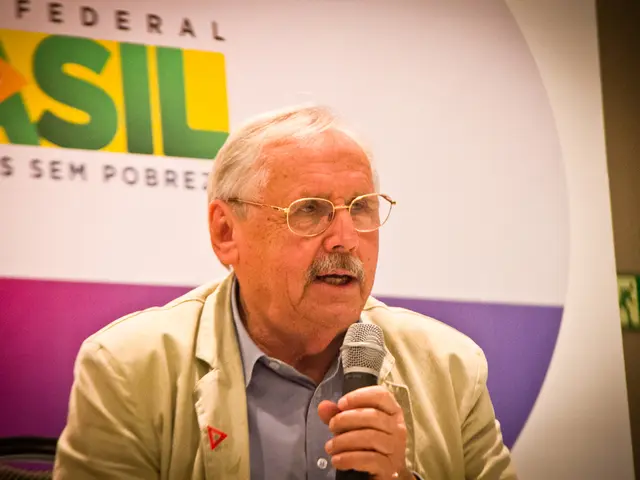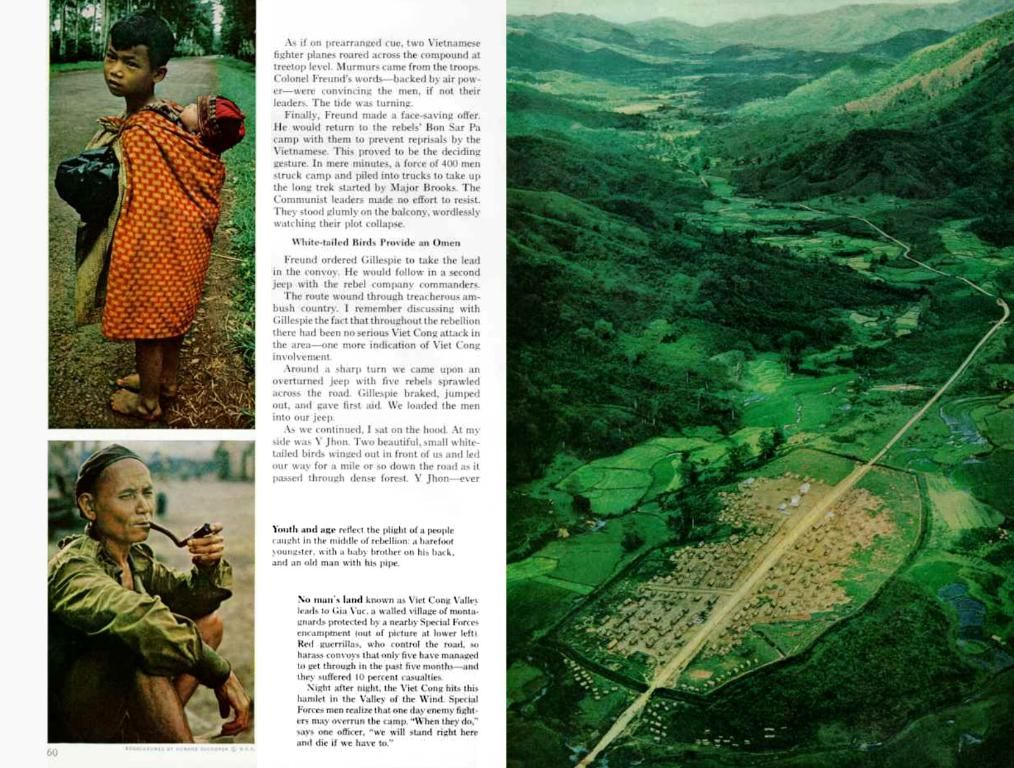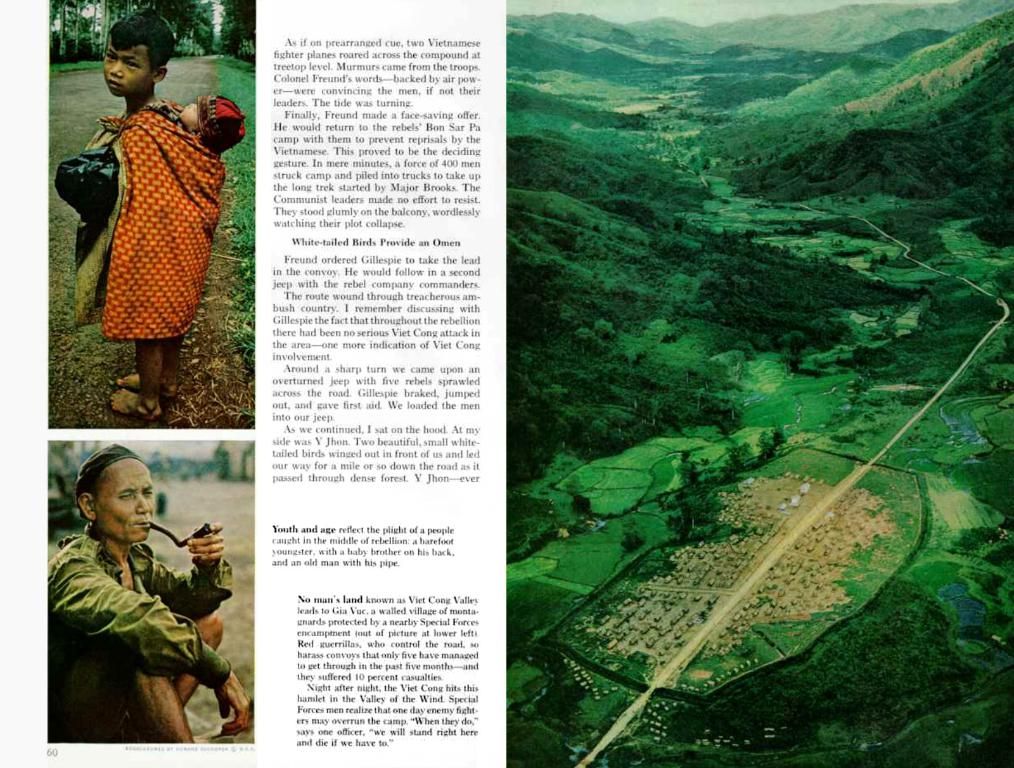Oman, the mediator in US-Iran nuclear discussions, reports 'certain' advancement
US-Iran Nuclear Talks in Rome: Progress Made, but Challenges Persist
The fifth round of negotiations between Iran and the United States over Tehran's nuclear program in Rome has concluded, with Omani mediator Badr al-Busaidi suggesting that some progress was made, but not conclusive. The talks are aimed at limiting Iran's nuclear program in exchange for the easing of economic sanctions imposed by the US.
American demands center on the cessation of Iran's uranium enrichment activities, a demand met with strong resistance from the Iranian government. Iranian Foreign Minister Abbas Araghchi has asserted that no enrichment would imply "we do NOT have a deal." In a Twitter post, Araghchi expressed the urgency of finding a deal, stating, "Figuring out the path to a deal is not rocket science...Time to decide."
Steve Witkoff, the Mideast envoy representing the US, and Michael Anton, the State Department's policy planning director, led the American delegation. Al-Busaidi was the mediator, with Oman serving as a trusted interlocutor between both countries in the negotiations, having previously mediated discussions.
Following the talks, Araghchi announced their conclusion on Friday afternoon. The negotiations were held at the Omani Embassy in Rome, with convoy movements indicating the start and end of the sessions. Iranian foreign ministry spokesman Esmail Baghaei confirmed Witkoff's departure, stating that he left because he needed to catch a flight. The talks continued without him in a "sane and calm atmosphere."
While the outcome of the talks remains uncertain, the consequences of a deal, or the lack thereof, are significant. The US has repeatedly threatened to launch airstrikes on Iran's nuclear facilities if a deal is not reached, while Iranian officials warn they may pursue a nuclear weapon if provoked. Iran has amassed a stockpile of uranium enriched nearly to weapons-grade levels, reducing the time needed to produce a nuclear device should they decide to do so.
However, experts suggest that even if Iran were to produce a working bomb, it would likely take them months to fully assemble it. The enrichment of uranium remains the central issue in the negotiations, with Iran insisting on continuing the activity within their own borders, a position that has not changed since 2010.
The ongoing negotiations are complicated by various regional and domestic factors. Israel has threatened to strike Iran's nuclear facilities independent of the US, while internal tensions in Iran, such as the mandatory hijab and potential increases in gasoline prices, have sparked unrest. Additionally, Iran's economic situation is sensitive, with its currency, the rial, faced a significant drop in value earlier this year, although it has since improved with the resumption of talks.
The Trump administration has continued to levy sanctions on Iran, including this week's focus on sodium perchlorate sales to the Islamic Republic. An explosion at a port near Bandar Abbas, resulting in numerous casualties, was linked to the importation of the chemical from China.
The next round of negotiations has not yet been scheduled, with the date and location to be determined. The outcome of these talks will play a significant role in shaping the future of US-Iran relations and the security of the Middle East.
(FRANCE 24 with AP)
- The progress made in the US-Iran nuclear talks, while significant, faces ongoing challenges.
- Science and technology, including rocket science, can provide solutions to complex problems if applied wisely.
- Migration patterns could be impacted if a nuclear deal is reached between Iran and the US, affecting various regions.
- Education and self-development are key to understanding the intricacies of nuclear negotiations and global politics.
- Personal growth and mindfulness are essential for negotiators to maintain focus and resilience during challenging discussions.
- War and conflicts pose threats to global stability and economic prosperity, making peaceful resolutions crucial.
- Productivity and career development hinge upon a stable, peaceful global environment.
- Policy-making and legislation play a vital role in shaping the outcomes of such talks, influencing the future of US-Iran relations.
- Car accidents and other unforeseen incidents can occur during negotiations, highlighting the need for contingency planning.
- Politics, both domestic and international, influence the negotiation process and the eventual agreement.
- Online education platforms can provide valuable resources for understanding the intricacies of the US-Iran nuclear talks and nuclear technology.
- Job-search strategies should consider the potential impact of these negotiations on various industries and economies.
- General news outlets are crucial for staying informed about the status of the US-Iran nuclear talks and their implications.
- Crime and justice issues might arise due to sanctions or other repercussions of the talks, necessitating an understanding of these facets.
- Accidents, such as the port explosion linked to chemical imports, can have devastating consequences and emphasize the importance of safe practices.
- Fires, either as a result of accidents or intentional acts, are also potential threats that require vigilance.
- Learning new skills, such as weather forecasting and crisis management, can aid in navigating unforeseen challenges in the negotiation process.
- Goal-setting is essential for negotiators, helping them focus on the desired outcomes and overcome obstacles.
- Lifelong learning is vital for staying informed and adaptable in the rapidly evolving landscape of global politics.
- Skills training in various areas, including sports analytics, can provide valuable perspectives on complex issues like the US-Iran nuclear talks.
- Sports, such as football, soccer, basketball, baseball, hockey, golf, and mixed martial arts, offer distractions and provide hope amidst crises.
- Champions League, NFL, WNBA, MLB, NHL, Premier League, American Football, NBA, Grand Prix, horse racing, and various European leagues continue to captivate fans worldwide.
- Weather forecasting is crucial for planning international negotiations, ensuring the safety and comfort of participants.
- teams must work together to compete successfully in sporting events and deal with adversity, similar to the cooperation necessary for successful diplomacy.
- Racing events, such as the premier league, American football grand prix, or horse racing, demonstrate the importance of strategy, teamwork, and staying ahead of the competition.
- In the face of uncertainty, such as the US-Iran nuclear talks, maintaining hope and focusing on personal growth, learning, and skills development can help navigate the challenges ahead.








